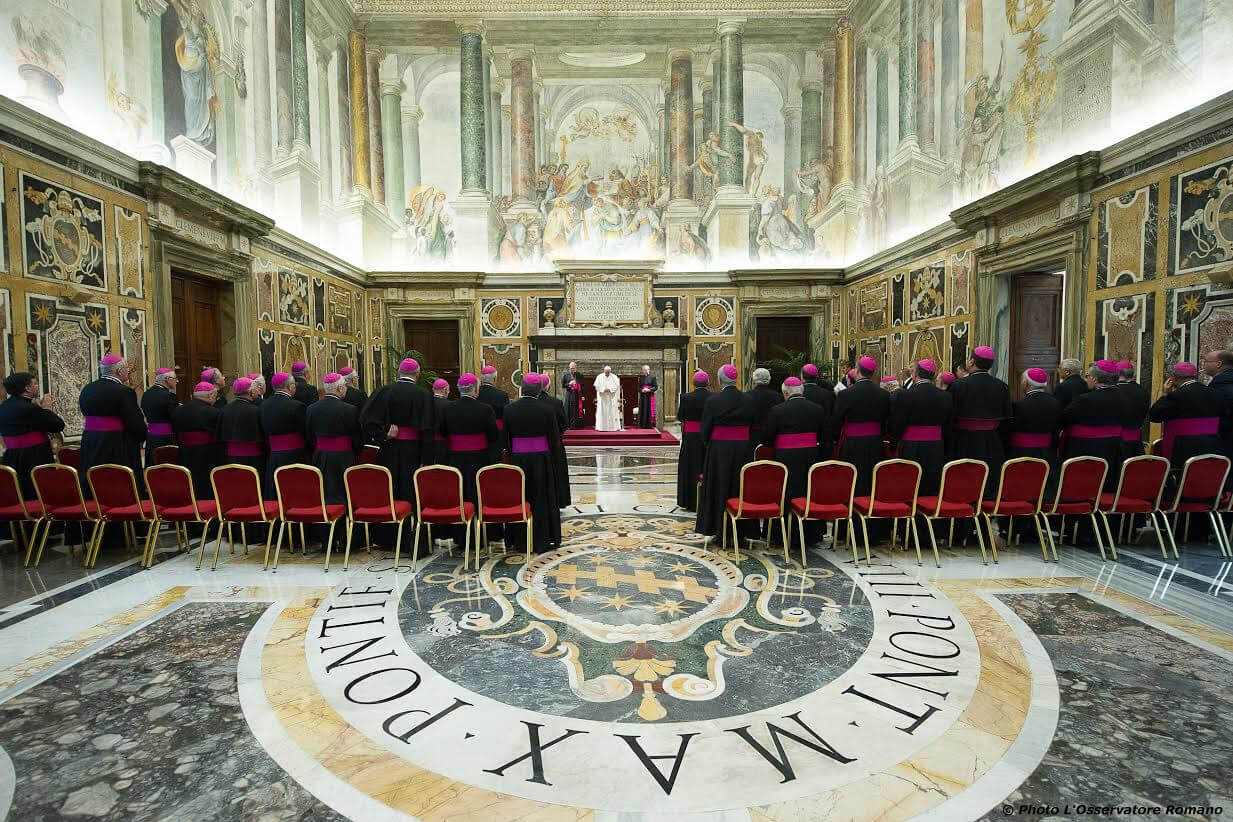Above: Vatican City – September 7, 2015. Pope Francis meets with Bishops of Portugal during their ad limina visit to Rome on September 7, 2015. Credit: © L’Osservatore Romano
The Future is not Franciscan
Ever since the revelations of Archbishop Viganò starting with his first letter in August of 2018, Pope Francis seems to be speeding up his agenda of Church reforms. By reforms we aren’t talking about venerable reforms, such as those of the 11th century in response to the Investiture Controversy, or the reforms implemented to combat and suppress the explosion of heresy during the 16th century in Europe. By reforms, Pope Francis seems to be liberalising the Church, especially in regards to sexual morals. In addition to that, reversing the legacy of Benedict XVI seems to be a priority of the Argentine Pope. Priests can no longer say the Tridentine mass at will, but can now give blessings to “couples” in relationships based on sin. This includes same-sex “couples,” adulterous “couples,” or even polygamous “couples.”
On December 18, Fiducia Supplicans hit the Church like a ton of bricks. It’s horrifically worded and confusing to no end. Certainly Pope Francis and Cardinal Fernández knew that they would receive pushback on this. They probably assumed that the usual suspects would speak out. Specifically Strickland, Burke, Viganò, Schneider and maybe a few others.
Instead something else happened. With the publication of this document, Pope Francis and Cardinal Fernández received opposition from entire bishops conferences, and in no small number. In the days that followed the bishops conferences of Africa, Eastern Europe, Kazakhstan and many other groups issued statements that this was causing confusion to the faithful and they would not be permitting these sinful blessings in their jurisdiction. Even in Canada, while accepting the document, the bishops did so in a highly qualified way. Other individual bishops and priestly confraternities issued statements saying that they wouldn’t bless couples in sinful relationships.
However, there was some acceptance. In Germany, Austria, and Belgium it was a very welcomed document. It certainly didn’t give these countries all that they wanted. However, they don’t see this as a concession but a stepping stone. They celebrate the move in their direction though they certainly want and expect the Church to arrive fully at their heretical position which is full liturgical sacramental marriages for same-sex “couples,” blessed and performed in totality.
The fiasco around this document reminds me of another document issued by the Vatican.That document is Traditionis Custodes, which was a direct attack on the legacy of Benedict XVI while he was still alive. The Pope probably wanted to wait for Benedict to die before reversing his great legacy of Summorum Pontificum but he knew that health wasn’t on his side.
When comparing these two documents and their reactions, we see a lot of the same, though there are important differences. Pope Francis probably thought that he was giving bishops around the globe a green light to stamp out the Latin Mass. He was in a sense, but the document was largely ignored. One can only assume how confused Francis was at this reaction. Surely most American bishops dislike the Latin Mass as much as he and Cardinal Roche did? Nope. Despite Cupich and a few other raging Liberals implementing heavy restrictions, little happened. This resulted in further attempts by Francis and Cardinal Roche to restrict the Latin Mass. Still, most bishops are ignoring it as best as they can. Everyone that I know in North America or Europe who attended the Latin Mass, still has access to it.
When looking at Traditionis Custodes and Fiducia Supplicans, we see a pattern. The majority of the Church isn’t what Pope Francis wants. Most bishops, even if they lean a bit to the left don’t have a problem with a Latin Mass in their diocese for those who wish to attend one. Similarly with blessing couples in mortally sinful unions. Many bishops and their priests don’t want anything to do with this and have very vocally said so.
There was a fundamental difference between these two documents. Traditionis Custodes was implemented to restrict something that existed. Fiducia Supplicans was implemented to permit something that until then didn’t exist. Traditionis Custodes was largely ignored because that’s all that was needed to be done. It was pretty easy, especially in the early stages before Cardinal Roche was working hard to make up for its failure. Reaction to Fiducia Supplicans was different. The bishops couldn’t ignore it like they did with Traditionis Custodes. They had to be proactive in opposition and they indeed were. Within days, numerous documents were issued by bishops conferences in opposition to blessing couples in sinful unions. This was a great display of faith, courage, and conviction. The kind of conviction that is needed to end the Modernist crisis in the Church and acclaim Jesus Christ on His rightful throne.
What is the future of the Church? Is it the Church where sexual sin doesn’t exist and doctrine is ignored? Or is it a Church where doctrine matters and pastoral activity is based on that doctrine? In other words, is it the church of Belgium and Germany, or the church of Cameroon and Poland?
There are no churches without priests. When the faith is no longer preached, vocations dry up. As Pope Francis’ fellow Jesuit Fr. Thomas Reese wrote a few years ago: “Finding young candidates for the priesthood… who support Francis and want to be celibate is like looking for Catholic unicorns.” Across the pond things are no different. Germany and Poland have about the same amount of Catholics, but as Cardinal Müller points out in his 2019 book Roman Encounters, Poland has 3500 seminarians, while Germany has 120. The future is not Jesuitical, or Franciscan for that matter.


